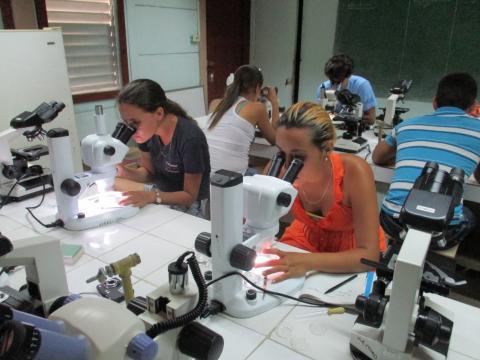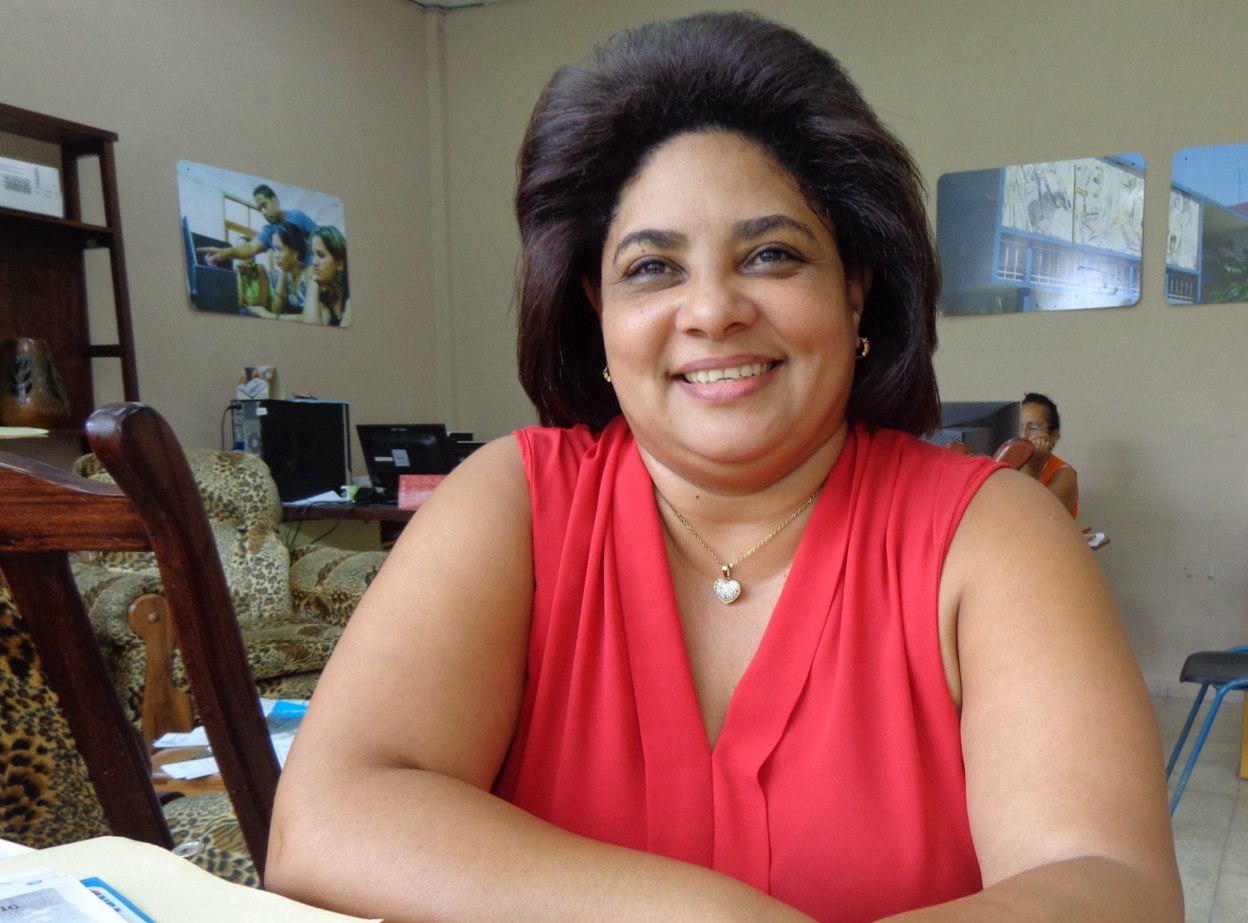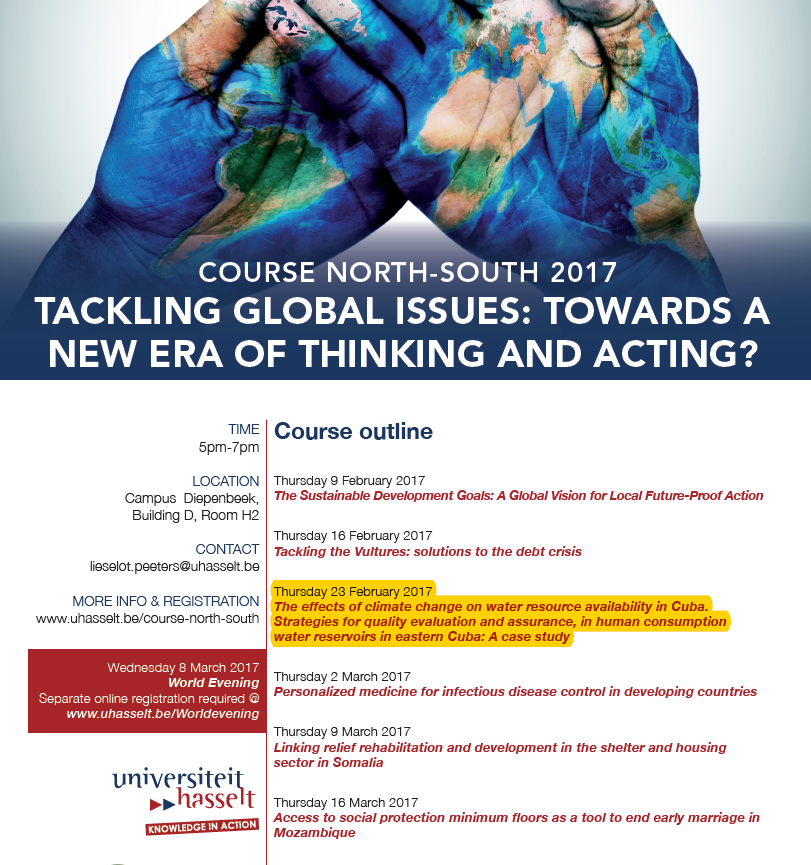
The current environmental studies that take place in Eastern Cuba encourage the dialogue with the Dr. Teresa Orberá, leader of one of the research projects of the Vlir-UOS program in the University of Oriente.
I first saw her in a photo. Then I recognized her in a meeting. Hello. Are you Teresa? That was our meeting. A couple of weeks later this interview took place. Now she is a faithful collaborator in the communication work.
What are the most important work lines of the P1, in charge of environmental scientific services for the development of sustainable agriculture and the confrontation of climate change?
"The project initially had two fundamental facets: one environmental aspect and another one aimed at tackling climate change, directly associated to sustainable food production. However, most of the results in this first stage directly contribute to the environmental side. The area of food production is not strengthened yet".
When explaining such situation, Dr. Teresa Orberá seems to feel this lack as her own; however, she manages to recover just in time to face the challenge of my next question.
What triggers this?
Tthe very evolution of doctoral students. At this moment, six doctoral students out of the initial eleven are left. Two of them have already defended their diploma theses. Therefore, the project has turned its focus primarily on working on water as a resource. First, we wanted to deal with the topic of water and agricultural ecosystems but our final target was water. We were summoned to partake in a conference to expose the Cuban experience in the management of environmental pollution.
Water is our fundamental research topic because everything that has a close relation with water is a limiting factor of agriculture and social development itself. Also, because in the case of fresh water reservoirs, the scarcity of water as a hydric resource was gradually becoming a highly limiting resource. For example, by decreasing the amount of water, cyanobacteria populations that are in a non-harmful number in certain places, proliferate. However, when increasing the presence of this microorganism, pollution attributable to the toxins generated by these bacteria in the water we take, emerges. "
Tireless in explaining, keen in her reflections, talking to Orberá is always pleasant.
- At an international level, countless efforts are being made to encourage the consumption of drinking water. Is this also the project's interest?
"Yes. I already told you about the reservoirs and, in terms of rivers and coastal waters, we look forward to having an environment that is as healthy as possible. We are mainly concerned with rivers, because they nourish the reservoirs and, in the case of marine ecosystems, pollution negatively changes the whole environment and affects the animals’ population that inhabits the coasts. These circumstances have a greater impact on the Caribbean, since countries depend fundamentally on their coasts quality. In order to use water as a resource, the territory advances in the desalination plant. "
Regarding equipment, this first stage of the project has had a considerable repercussion. Can you describe it?
"Yes. We set up a laboratory for the integral analysis of water as a resource, located in the National Center for Applied Electromagnetism (CENEA). It has high-resolution microscopy equipment, and inverted microscopes. Moreover, we are buying phase contrast microscopes. A Water Analyzer where the analysis of all the chemical-physical parameters necessary to evaluate the water quality was acquired. To date, such analyses were performed separately. Not only does it analyze water, but also liquids in general. Furthermore, one of its possible implementations is to use it to analyze industrial liquids. In Cuba, there are only two similar equipment. A research group from the Universidad Central de las Villas, who are asking us for training, must have already bought another one. "
Does the provision of this equipment have a scope outside the University?
"Doctoral students mostly benefit from the equipment. At the present, we are also buying large quantities of reagents; however, we do not have enough reagents to provide them for industries and institutions, but we do make extensive the use of this equipment to areas such as Biology, Chemical Engineering, and Hydraulics.”
Starting from this experience, what will be the priorities in a second stage?
We must focus on the issue of food production: it is indispensable in a province like Santiago de Cuba, whose economy is mainly agricultural and its development is still insufficient. The production of vegetables is still scarce, and I think that the University should contribute to this effort. We have the assistance of the Department of Agricultural Engineering. Consequently, that will be our priority in the coming years, while we tribute to several lines of research such as food production, environment and, to a lesser extent, agricultural biotechnology "
I know this is her biggest challenge although she does not explicitly state it. It is easily perceived when she passionately speaks about the Vlir program as a life and training experience for those who manage science from this Higher Education center.
"Regarding the work of project leaders - she declares - learning is relevant in the management of science and resources that contribute to its development. Associating learning to the formation of human resources is an important qualitative leap.
Once the project ends, the University will have people better trained to lead the management of science and the equipment acquired. This represents a great step in learning. Our challenge is to learn how to use and operate this equipment in the most possible optimal way. Another challenge is the impact of the UO in the socio-productive environment, because if we know how to optimize human and material development, we can have a major bearing on the development of enterprises, national priority programs such as water resources, biotechnologies, medical equipment, and agriculture. The University must position itself in the eastern region, positively influencing industries, institutions, and prioritized science programs".

Dr. Teresa Orberá points out that project leaders broaden their vision and are trained in the management of science.

Thus far, the main results that have been obtained were presented by the Coordinator of the project Dr. Teresa Orberá at the International Course North - South 2017: Tackling Global Issues: Towards a New Era of Thinking and Acting? of the University of Hasselt. Photos: courtesy Dr. Teresa Orberá. Translator: Lilia Sans

